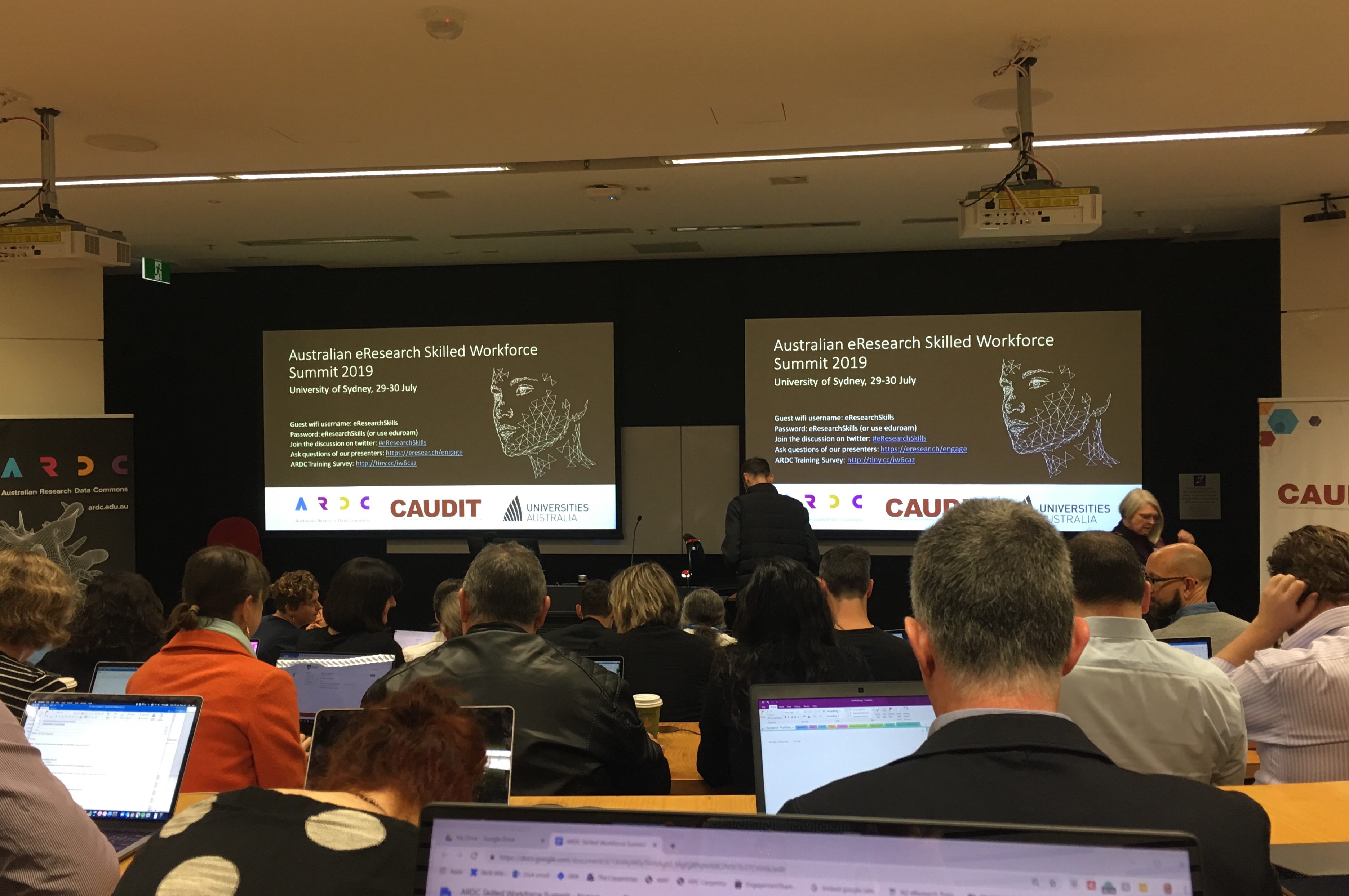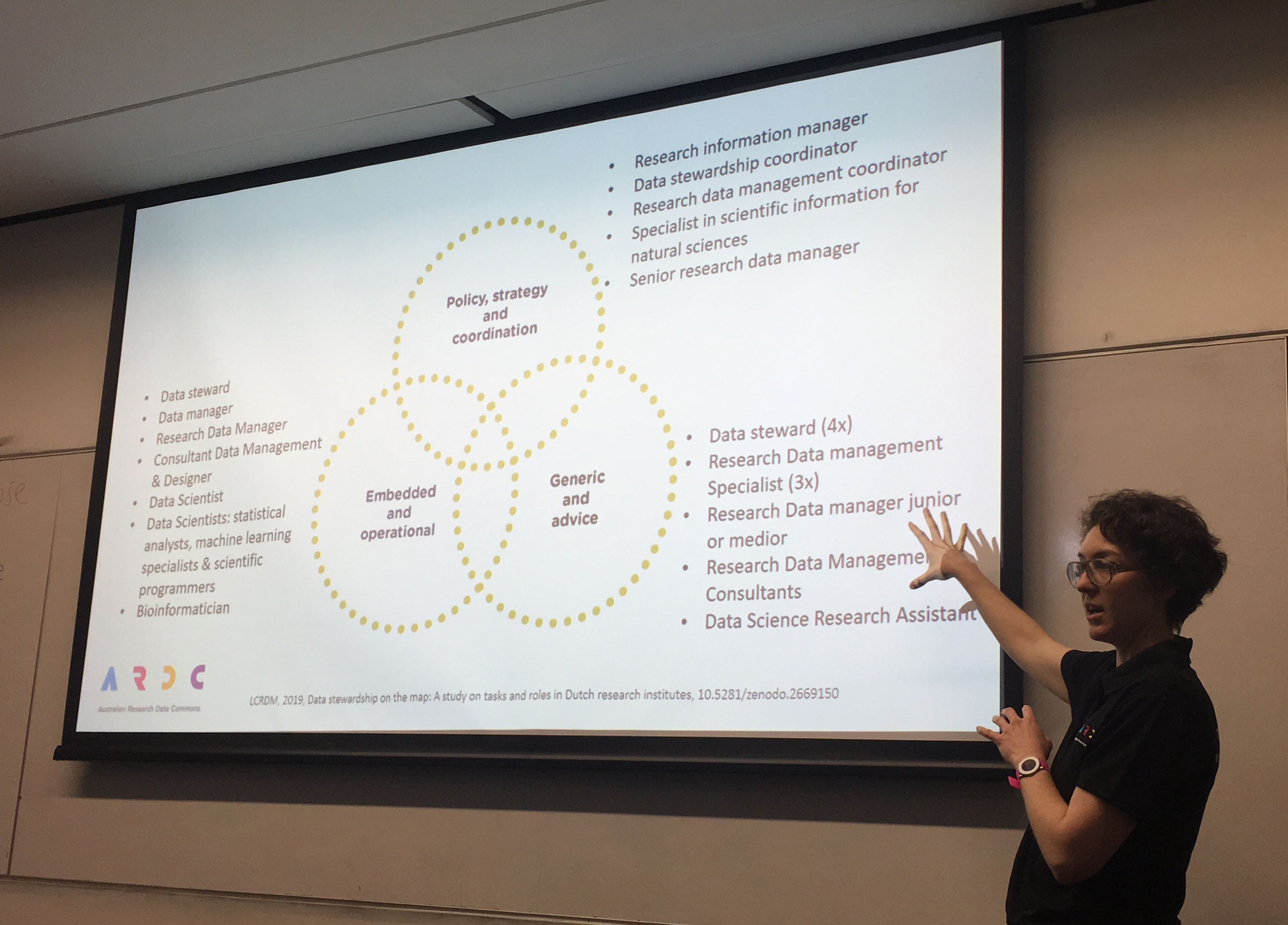Building skills for data-enabled research: Insights from the Australian eResearch Skilled Workforce Summit
During 29-30 July, I had the opportunity to represent NeSI and New Zealand at the Australian eResearch Skilled Workforce Summit in Sydney, Australia.
This inaugural event hosted data stewards, instructors, and a variety of research support professionals to discuss the big questions that challenge research, such as “What skills do our researchers, data or software specialists, and research support staff need to survive and thrive in this new world of data-enabled research?”
Nearly 200 attendees from a variety of Australian institutions, as well as a few international organizations (including NeSI and The University of Auckland’s Centre for eResearch), discussed challenges and shared ideas on how to best support the growth in capability of a nation’s research sector.
With five months under my belt as NeSI’s Training Coordinator, attending this event helped me to better recognize and understand the nuance and complexity that surrounds eResearch upskilling initiatives.
Different organizations have differing obligations to their local community and to the academic sector of which they belong. This made for rich conversation and idea swapping. One attendee stated, “I’ve been able to have conversations I haven’t been able to have for seven years.”
Conference coordinators took advantage of this rare meeting of infrastructure providers, governing bodies, and institutions by asking attendees on Day 1, “What needs to change to improve digital skills development?” Interestingly, improved career paths and recognition emerged as the top concerns of the group, more so than policy change, community building, developing repositories for learning material, or even teaching itself.
These insights are very relevant to NeSI, particularly as our team and collaborators implement NeSI’s training strategy and evolve our understanding of the eResearch training landscape within New Zealand.
Like several of our international counterparts, NeSI is a member of The Carpentries, an international community that provides the support and materials necessary for delivering foundational computational and data management skills to researchers.
In fact, a core part of NeSI’s training strategy since 2015 has been the Carpentries’ ‘train the trainer’ approach, where NeSI has focused on supporting and growing New Zealand’s pool of workshop instructors — people committed to delivering high-quality, fundamental digital skills workshops at their local institutions.
This strategy accepts the fact that NeSI cannot address the needs of all of New Zealand researchers alone and, fortunately, does not have to. Through partnerships and collaborations with the other three Carpentries members in New Zealand — ESR, the Universty of Otago, and Genomics Aotearoa — New Zealand has the highest number of Carpentries workshops per capita in the world.
Attending an event like the eResearch Skilled Workforce Summit challenged me to acknowledge that the demand for fundamental digital skills training cannot be fixed by workshops alone. Participants at the Summit grappled with this issue, discussing sustainability and scaling in the context of upskilling. The needs of researchers are incredibly varied and learning takes time — more time than the typical two-day duration of most Carpentries workshops.
So how do researchers continue to build capability outside of workshops? No one at the Summit had a complete answer yet. We are, however, starting to see an eResearch training community emerge in Australia / New Zealand that moves beyond a one-workshop-fits-all approach.
Carpentries workshops are being incorporated into ResBaz events, hacky hours are becoming more common, and online training opportunities are increasing. For example, NeSI is expanding its training offerings to include more webinars and online hacky hours.
Along with an increase in eResearch training variety, there is also a growing number of opportunities for eResearch trainers to get support. Examples include The Carpentries Community Slack channels and community calls, and conferences like the Skilled Workforce Summit, eResearch Australasia, and eResearch NZ that continue to highlight the successes and challenges in cultivating digital literacy.
Discussions are ongoing, and NeSI remains committed to understanding the training needs of researchers throughout New Zealand. Personally, I am inspired by the enthusiasm that drives these conversations and initiatives, and I’m looking forward to the next Skilled Workforce Summit and other future eResearch events.







